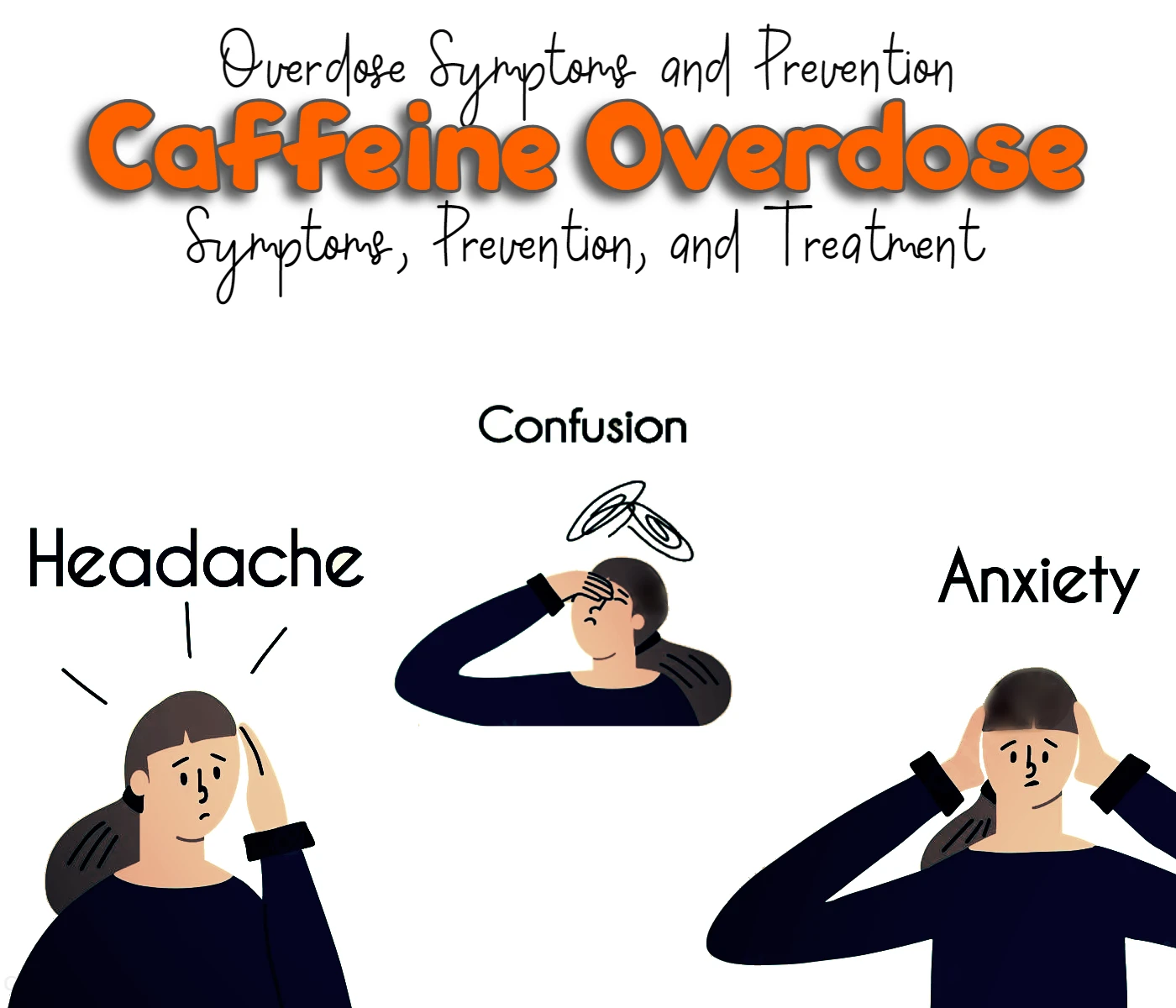Caffeine Overdose

Hey there! Are you a coffee or tea lover who can’t start your day without a caffeine fix? While caffeine can have positive effects on our bodies, too much of it can be harmful. In fact, consuming too much caffeine can lead to a range of symptoms, including jitters, insomnia, increased heart rate, headaches, anxiety, nausea, vomiting, dehydration, and chest pain. That’s why it’s important to be aware of the signs of caffeine overdose and take steps to prevent it.
In this blog post, I’ll be sharing everything you need to know about caffeine overdose. From the symptoms to the prevention and treatment options, you’ll learn how to safely consume caffeine without putting your health at risk. I’ll also be providing some tips on how to monitor your caffeine intake, avoid hidden sources of caffeine, and gradually decrease your intake if necessary.
So if you’re a caffeine lover, this blog post is for you! By the end of it, you’ll have a better understanding of how caffeine affects your body, how to recognize the signs of caffeine overdose, and how to enjoy the benefits of caffeine without the harmful side effects. So, what are you waiting for? Read on to end my blog and start taking control of your caffeine intake today!
What is caffeine overdose?
Caffeine overdose occurs when you consume too much caffeine. It is important to note that the amount of caffeine that can lead to an overdose varies from person to person. Some people may be more sensitive to caffeine, while others may have a higher tolerance. The average person can safely consume up to 400 milligrams of caffeine per day, which is about four cups of coffee. However, consuming more than that can lead to caffeine overdose.
Signs and Symptoms of Caffeine Overdose
Caffeine overdose can have a range of symptoms, and they can vary in severity. Here are some of the most common signs and symptoms:
- Jitters and Nervousness
One of the first signs of caffeine overdose is jitters and nervousness. You may feel restless, and your hands may tremble. This is because caffeine stimulates your nervous system, which can cause an increase in adrenaline.
- Insomnia
Caffeine can interfere with your sleep, especially if you consume it late in the day. If you are experiencing insomnia, it could be a sign that you have consumed too much caffeine.
- Increased Heart Rate
Another sign of caffeine overdose is an increased heart rate. Caffeine stimulates your heart, which can cause it to beat faster. This can be dangerous, especially if you have a pre-existing heart condition.
- Headaches
While caffeine can be used to treat headaches, consuming too much caffeine can also cause them. If you are experiencing a headache after consuming caffeine, it could be a sign of caffeine overdose.
- Anxiety
Caffeine can also cause anxiety, especially in people who are prone to it. If you are feeling anxious after consuming caffeine, it could be a sign that you have consumed too much.
- Nausea and Vomiting
Consuming too much caffeine can also cause nausea and vomiting. This is because caffeine can irritate the lining of your stomach, which can cause these symptoms.
- Dehydration
Caffeine is a diuretic, which means that it can cause you to urinate more frequently. This can lead to dehydration, especially if you are not drinking enough water.
- Chest Pain
In rare cases, caffeine overdose can cause chest pain. This is because caffeine can cause your heart to work harder than it should, which can lead to chest pain.
How to Prevent Caffeine Overdose
Now that you know the signs and symptoms of caffeine overdose, here are some tips to help you prevent it:
- Monitor Your Intake
The first step to preventing caffeine overdose is to monitor your intake. Keep track of how much caffeine you consume in a day and try to stay within safe limits.
- Be Aware of Hidden Caffeine
Caffeine is not just found in coffee and tea. It is also found in many other foods and beverages, such as chocolate, energy drinks, and some medications. Be aware of the caffeine content of these products and try to limit your consumption.
- Gradually Decrease Your Intake
If you are consuming too much caffeine, try to gradually decrease your intake. This will help your body adjust to the lower levels of caffeine and prevent withdrawal symptoms.
- Avoid Caffeine Late in the Day
If you are having trouble sleeping, avoid consuming caffeine late in the day. Caffeine can stay in your system for several hours, so consuming it too close to bedtime can interfere with your sleep.
- Stay Hydrated
Drinking plenty of water throughout the day can help prevent dehydration, which can be a side effect of consuming too much caffeine.
- Consider Switching to Decaf
If you are consuming too much caffeine, consider switching to decaf coffee or tea. Decaf still contains a small amount of caffeine, but it is much lower than regular coffee or tea.
- Talk to Your Doctor
If you are experiencing symptoms of caffeine overdose, talk to your doctor. They can help you determine the cause of your symptoms and develop a plan to prevent future episodes.
Conclusion
Caffeine is a widely used stimulant that can have positive effects on our bodies, but it can also be harmful if consumed in excess. Caffeine overdose can lead to a range of symptoms, including jitters, insomnia, increased heart rate, headaches, anxiety, nausea, vomiting, dehydration, and chest pain. To prevent caffeine overdose, it is essential to monitor your intake, be aware of hidden sources of caffeine, gradually decrease your intake, avoid caffeine late in the day, stay hydrated, consider switching to decaf, and talk to your doctor if you experience symptoms. By following these tips, you can safely enjoy the benefits of caffeine without the harmful side effects.
FAQs
Yes, it is possible to die from a caffeine overdose, although it is rare. Ingesting more than 10 grams of caffeine at one time can be fatal.
The half-life of caffeine is about 5-6 hours, which means that it takes that long for half of the caffeine to be eliminated from your body. It can take up to 10-12 hours for the effects of caffeine to wear off completely.
Yes, it is possible to overdose on caffeine pills. Caffeine pills can contain a much higher amount of caffeine than a cup of coffee, so it is important to be aware of the dosage and not exceed the recommended amount.
Coffee, tea, energy drinks, chocolate, and some medications, such as certain pain relievers and weight loss supplements, are common sources of caffeine.
If you are experiencing symptoms of caffeine overdose, such as jitters, nausea, or chest pain, seek medical attention immediately. Caffeine overdose can be serious and can require medical treatment.
Read More:





